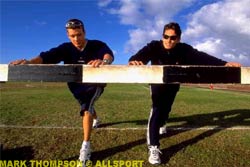|
Monday February 26th, 2001 By Alan Baldwin
Judging from what he has seen so far in the gym, Benetton's fitness supremo expects the 21-year-old to act as a wake up call for some of those on the grid in the season starting in Australia on Sunday. "All you old and bold drivers out there, watch out for this boy because I think he really is hungry," Shrosbree said in an interview at the team's headquarters. "I really, really believe we have got a future star." When Button arrived in Melbourne for his Formula One debut with Williams last year, Grand Prix experience was not the only thing he lacked. He had barely two months to hone his fitness between securing his drive and lining up with the likes of Michael Schumacher and Mika Hakkinen. It was a tough baptism, physically as much as mentally, but the situation will be very different this year. Button now has his fitness closely supervised by Shrosbree, a man who served 13 years in the Royal Marines and Britain's special forces -- as well as competing in triathlons -- and has no time for slackers. He is delighted with his new pupil. "We've brought him on just since we started in January to an incredible level already," he said, describing Button as "like a breath of fresh air" for his attitude. "He's staying away the week after Australia and straight away his management team have asked for a programme because Jenson has said he wants to maintain his fitness before Malaysia," said Shrosbree. "That never used to happen. It was 'What luxury holiday am I going on?'...the key thing for his management in booking his hotel was 'is there a gym there?'" Beer and Cigarettes Shrosbree said Button's Italian team-mate Giancarlo Fisichella was also in better shape than ever after a rigourous close-season programme. "You'll see a big difference in Fisichella this year," he said. "Fisichella's really worked hard this season. "He did find it hard to adapt into this but he's a different guy this season, absolutely different." The days when an oil-streaked driver would be photographed at the end of a race with an unfiltered cigarette dangling on his lips or thirstily downing bottles of beer in the pits are long gone. Drivers such as Jordan's Italian Jarno Trulli, who ran the New York marathon last year, are more the norm. With the man behind the wheel subjected to massive G-forces from cars capable of reaching speeds in excess of 300 kph, fitness can make the difference between success and failure. Spectators may imagine otherwise but the 22 drivers on the grid next Sunday know that even the most outrageous natural talent is no longer enough on its own. Electronic driver aids, such as traction control, may make cars smoother and easier to drive but the systems will not reduce the crushing G-forces. Generated by harsh braking and accelerating, these have the effect of turning a driver's head and helmet -- together weighing three to four kilos -- into a weight equivalent to around 20 kilos. Multiply that by an average of 15 corners per lap for 70 laps and you have some idea of the forces a driver's neck alone must withstand during a race, often in high temperatures and energy-sapping humidity. It is something that requires special weight training to build muscles rarely used in daily life. "If you took an ordinary person who classed himself as really, really fit and stuck him in a car for probably 10 laps, the next day they probably wouldn't be able to lift their head off the pillow," said Shrosbree. Insurance Policy Shrosbree, whose official title is "Human Performance Manager", defines his role as one of eliminating errors and ensuring the drivers are as race-ready as possible. "But it's not just fitness. We run everything, the nutritional side, the driver preparation, the physiotherapy. We actually run the driver's food side of it. We more or less lay down the law on what the driver eats. "All the time I'm looking for that extra edge because that's my job -- to enhance performance and eliminate errors," he said. He added that fitness was also an insurance policy against serious injury in crashes since proper conditioning develops the muscles that protect vulnerable organs and bones from far more serious damage. Shrosbree makes the comparison of a boxer who concentrates solely on strength but neglects to condition his torso, leaving him vulnerable to broken ribs. Fatigue can also undo all the good work a team may have done in developing the car. "It's no good having a 12 million pounds wind tunnel and finding the odd 100th of a second if five laps to go you're saying to the driver "what's going on?" and he doesn't answer because he's puffing and panting trying to concentrate," said Shrosbree. "There's only so much you can blame on tyres, understeering and oversteering, etc. "I think this (fitness training) has become the new cutting edge in motorsport teams. You've got to be exceptionally fit or you won't get away with it any more."
| ||||||
